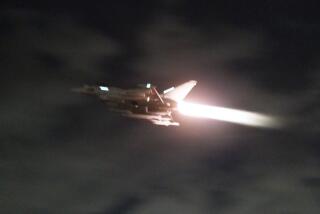Bush Rejects Iran Reports
WASHINGTON — President Bush insisted Monday that the United States and its allies could force a halt to Iran’s nuclear program by using diplomacy rather than force, and said reports that the United States was planning a military attack on Iran were “wild speculation.”
Appearing before a group of international relations students, Bush volunteered that he had read accounts suggesting the United States was preparing for an attack, but said efforts to prevent Iran’s nuclear program from being used for production of atomic weapons “doesn’t mean force, necessarily.”
“In this case, it means diplomacy,” he told students at the Johns Hopkins School of Advanced International Studies in Washington.
But White House Press Secretary Scott McClellan, in dismissing the news reports, seemed to acknowledge that the Pentagon had been at least laying plans for an attack, should one become necessary.
“Those who are seeking to draw broad conclusions based on normal military contingency planning are misinformed or not knowledgeable about the administration’s thinking,” he said.
Bush was responding to reports this week in the New Yorker magazine and Washington Post that have stirred wide international comment. The New Yorker article said some U.S. officials had been weighing the possibility of using tactical nuclear weapons to get at deeply buried and heavily reinforced nuclear facilities.
The reports came as United Nations nuclear inspectors were returning to Iran. Mohamed ElBaradei, director-general of the International Atomic Energy Agency, is due in Tehran this week for talks on the nuclear standoff, before his agency reports to the U.N. Security Council at the end of the month. The atomic agency is not satisfied that Iran’s nuclear program is for purely peaceful uses, as Tehran says it is.
The renewed attention to U.S. military planning on Iran has put the administration in an awkward position. Though U.S. officials want Tehran to believe they could mount a military attack, word of American preparations alarms allies and could undermine the U.S. effort to bring worldwide pressure on the Iranians.
British Foreign Secretary Jack Straw said Sunday that talk of a military attack was “completely nuts.” On Monday, a Pakistani Foreign Office spokeswoman told reporters that government officials “have said repeatedly that we are opposed to military action.”
Jon Alterman, director of the Middle East program at the Center for Strategic and International Studies in Washington, said the Bush administration had to avoid an adverse reaction not only from European and Middle Eastern allies, but from Security Council powers Russia and China.
“Suddenly it looks [to others] like the policy is not tough diplomacy, but the path to war,” Alterman said.
Straw’s sharp repudiation suggests that the Blair administration is worried about the reaction of Britons, most of whom think their government blundered by following the U.S. into war in Iraq, Alterman said.
Bush has said for months that though his goal is to deal with Iran’s nuclear program through diplomacy, he will not take the military option off the table. Defense officials also have said that they have prepared plans for military action against Iran, but insist that fact does not signify an intent to use them.
Many administration officials consider a military strike unwise, in part because it could set off an international outcry without necessarily dealing a lasting setback to Iran’s widely dispersed nuclear infrastructure.
In Luxembourg, Javier Solana, the European Union’s foreign policy chief, said news reports on the strike had “nothing to do with reality.”
“Any military action is absolutely [off] the table for us,” Solana said.
Solana acknowledged that EU leaders were considering sanctions of their own if none are passed by the Security Council. But talk of sanctions is in the early stages, he said.
Republicans moved to deflect speculation over the administration’s intentions. Senate Majority Leader Bill Frist of Tennessee, traveling in Russia, said, “We believe there has been much overstatement in the American press over the last several days with regard to the use of military force in Iran.”
Ali Larijani, the secretary of Iran’s Supreme National Security Council, also dismissed what he termed U.S. “bullying,” calling reports of possible military action “psychological warfare.”
“If the U.S. commits such a mistake, it would receive a convenient answer,” Larijani said, according to a report by the state news agency IRNA.
Meanwhile, speculation about an attack on Iran drove oil prices to record highs in some markets. Despite Bush’s denials, the benchmark crude oil futures contract in New York rose $1.35 to $68.74 a barrel, nearing the all-time high of $69.81 reached Aug. 30 in the wake of Hurricane Katrina.
Times staff writer Alissa J. Rubin in Geneva contributed to this report.
More to Read
Sign up for Essential California
The most important California stories and recommendations in your inbox every morning.
You may occasionally receive promotional content from the Los Angeles Times.











